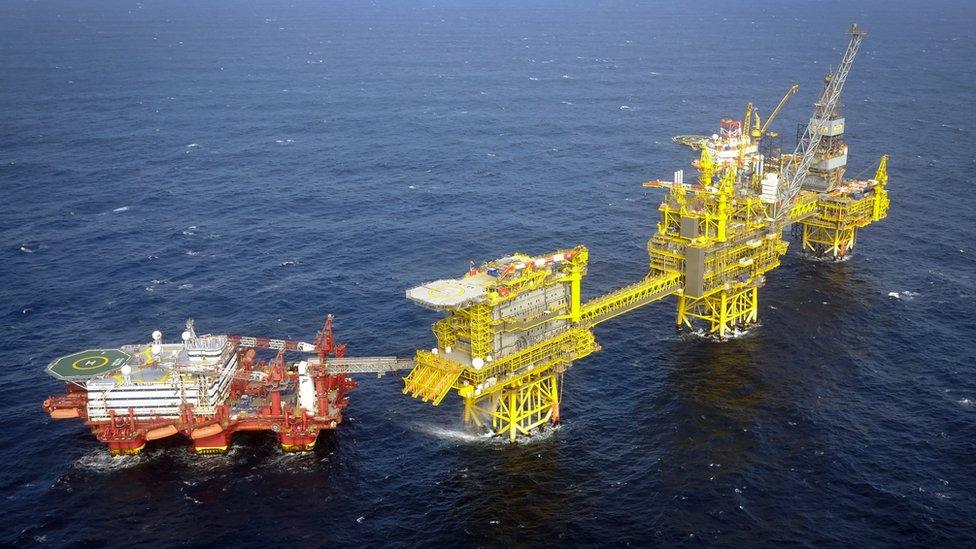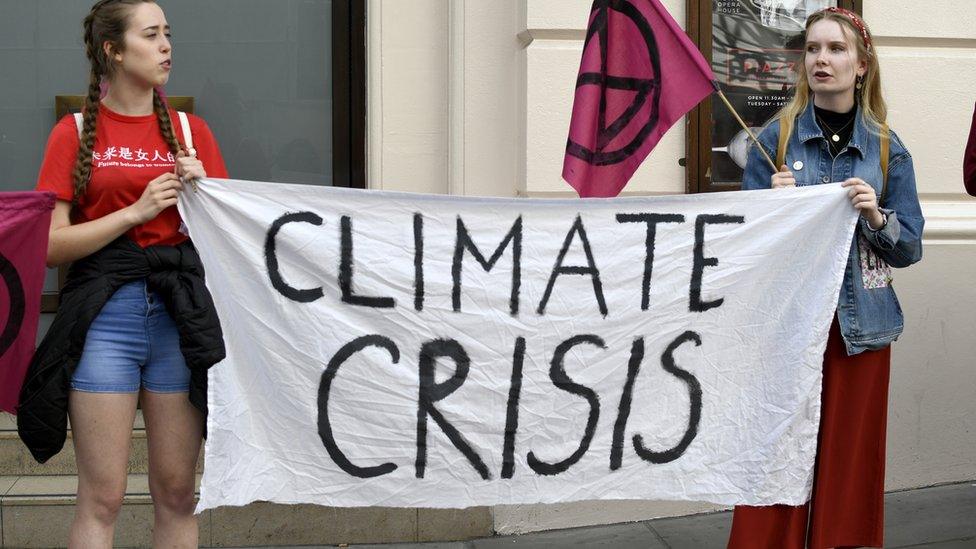Climate change: Oil industry argues for maximum production levels
- Published

The industry has argued for continuing at maximum levels
The UK's oil and gas industry has said the best response to tackling greenhouse gas emissions is to continue production at maximum levels.
Oil and Gas UK's "Roadmap to 2035", external argued consumption would remain above the levels they could produce.
It said maintaining output at 1.1 million barrels per day would reduce the need to import fossil fuels.
Environmental campaigners WWF Scotland said the industry needed to "get serious" about tackling climate change.
Scottish Green MSP Mark Ruskell, the party's energy spokesman, said the industry was "putting its own interests ahead of our survival".
"The science cannot be any clearer on this," he said. "Fossil fuels must be left in the ground."
Despite efforts to reduce consumption of oil and gas, the industry report predicted UK demand in 2035 - as outlined by the Committee on Climate Change - would still be significantly more than the UK could produce.
Even after a rapid drop in demand in the years to 2050, forecast to be half the current consumption level, the UK would still only be able to produce 30% of the total, the report said.

Analysis: Kevin Keane, BBC Scotland environment correspondent
A climate emergency has been declared and the world is fathoming out how to address it.
And with the finger firmly pointed at the burning of fossil fuels, the oil and gas industry is at the heart of it.
So, how do they respond? By saying "carry on".
Their argument is that we will still need oil and gas and that it is better to get it here than ship it in from thousands of miles away.
But the problem is that oil is a global commodity. So there's no guarantee that crude from the North Sea won't be put on tankers and sent to the other side of the warming planet.
It is different with gas which mainly comes ashore in pipes. And in 2050 we'll probably use more gas than oil.
The reality is that despite calls from the green lobby to "leave it in the ground", we'll still be consuming lots of it when we are net-zero.
But with such a heavy focus on the climate just now, that's a difficult PR war to win.

Big challenges

Deirdre Michie, chief executive of Oil and Gas UK, said the Roadmap 2035 showed an industry with a credible plan for the future.
She said: "While we don't have all the answers to the big challenges we face, we have started work on what we know can be done."
Ms Michie said the UK needed to recognise the continued role of oil and gas in a diverse energy mix.
The Scottish and UK governments have both agreed to the recommendations of the Committee on Climate Change, which looked at realistic targets for reducing emissions.
They legally commit the UK government to reaching net-zero by 2050 and the Scottish government by 2045.
'Fall well short'
Net-zero is the point where we are offsetting the same amount of greenhouses gas as we are emitting.
Environmentalists have been arguing that the best way to achieve that is to leave fossil fuels in the ground.
Lang Banks, director of WWF Scotland, said the North Sea oil and gas industry needs to get serious about helping to address the global climate crisis.
He said: "Sadly, the actions set out in the oil and gas industry's 2035 Roadmap fall well short of what is actually needed to address today's climate emergency and accelerate a transition to a zero-carbon future that is fair for workers and communities."
Carbon capture
The industry also said it was strongly placed to develop new technology to help offset greenhouse gas emissions, such as carbon capture, usage and storage (CCUS).
The UK's first carbon capture and storage project could be operational by the mid-2020s. It will see carbon dioxide piped to storage sites under the North Sea.
CCUS is seen as a vital tool in reducing net-emissions with predictions that 175 million tonnes of carbon dioxide per year will have to be captured and stored by 2050.
The report said the UK is in a "unique position to lead in the development of CCUS" because depleted oil reservoirs can be used as storage facilities.
And it added that "company assets, expertise and investment" from the oil and gas sector will be central in developing the technology.
- Published29 August 2019

- Published22 August 2019

- Published11 March 2019

- Published2 May 2019
